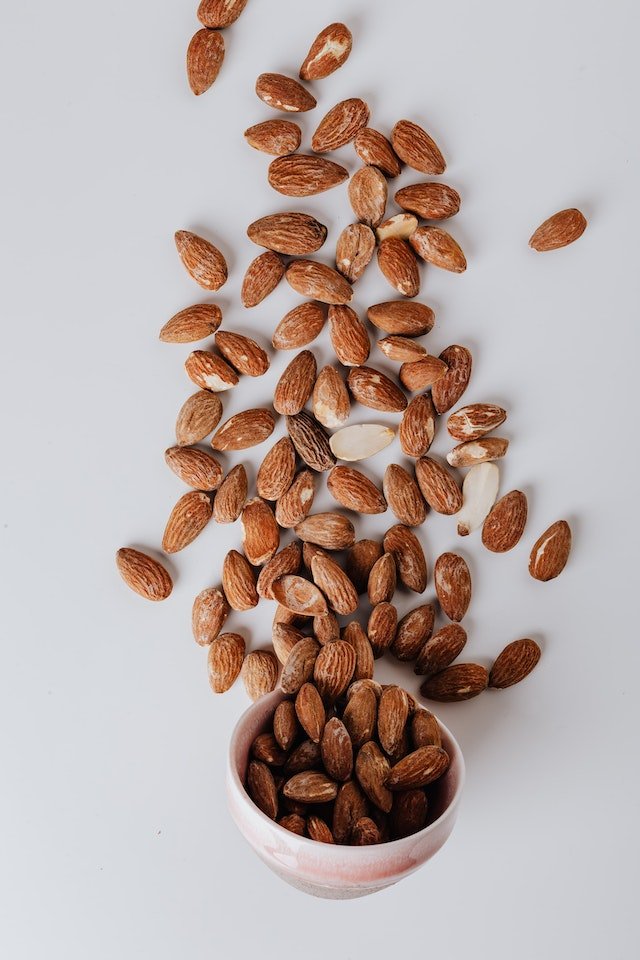Almond Excellence: Unveiling Their Nutritional Riches and Culinary Versatility
Almonds are the seeds of the fruit of the almond tree (Prunus dulcis), which is native to the Middle East and South Asia. Encased within a tough, pit-like shell, the almond seed is nestled inside. They are often referred to as nuts, but they are botanically seeds. For millennia, people across the globe have included almonds in their diets. Presently, approximately 80% of the world’s almond production occurs in California. Almonds are widely used in various culinary applications, finding their way into foods and even serving as a flavorful addition in beverages worldwide.
Nutrition Facts
1 cup (approximately 143 grams) of whole, raw almonds is as follows:
- Calories: 828 kcal
- Protein: 30.3 grams
- Dietary Fiber: 17.9 grams
- Total Fat: 72 grams
- Saturated Fat: 5.43 grams
- Carbohydrates: 30.9 grams
- Calcium: 385 milligrams
- Iron: 5.3 milligrams
- Magnesium: 386 milligrams
- Phosphorus: 688 milligrams
- Potassium: 1050 milligrams
- Folate: 62.9 micrograms
Please note that the exact nutritional content can vary slightly based on factors like almond variety and processing.
Health Benefits of Almonds
Optimal for Cardiovascular Health
Almonds are heart-healthy nuts. The monounsaturated fats, fiber, and antioxidants in almonds can help reduce the risk of heart disease by lowering LDL (bad) cholesterol levels and improving overall heart health. In addition, the potassium content in almonds can help regulate blood pressure, which is important for cardiovascular health.
Healthy Weight
Despite their relatively high calorie content, almonds can support weight management. The combination of healthy fats, protein, and fiber in almonds helps you feel full and satisfied, reducing overall calorie intake.
Blood Sugar Control
Almonds have a low glycemic index, which means they have a minimal impact on blood sugar levels. This can be beneficial for people with diabetes or those looking to maintain steady energy levels.
Make Bones Stronger
Almonds are a good source of calcium and magnesium, both of which are essential for strong and healthy bones.
Brain Health
The vitamin E content in almonds may help protect brain cells from oxidative stress and age-related cognitive decline. Almonds are often considered a brain-boosting food.
Healthier Gut
The dietary fiber in almonds can aid in digestion and help prevent constipation. It promotes a healthy gut microbiome, which is important for overall digestive health.
Mood Improvement
Almonds contain nutrients like magnesium, which may play a role in regulating mood and reducing symptoms of depression.
Ways to Enjoy Almonds
Almonds can be enjoyed in various ways, whether as a simple snack, a flavorful addition to dishes, or in various forms like almond butter or almond milk. Here are some common ways to prepare and use almonds:
- Whole Almonds as a Snack: You can simply eat almonds as a healthy and convenient snack. Almonds are delicious on their own or can be mixed with other nuts and dried fruits to create a trail mix.
- Almond Butter: To make almond butter, you can roast almonds (optional for added flavor), and then blend them in a food processor until they reach a creamy consistency. You can add a pinch of salt or a sweetener like honey if desired.
- Almond Milk: To make almond milk, blend soaked almonds with water, then strain the mixture through a nut milk bag or fine mesh strainer. You can add a sweetener and a pinch of salt to taste. Homemade almond milk can be used in various recipes or as a dairy milk substitute.
- Toasted Almonds: Toasted almonds have a rich, nutty flavor. Simply spread them on a baking sheet and roast in the oven at 350°F (175°C) for about 10 minutes, or until they turn golden brown. You can use toasted almonds in salads, as a topping for oatmeal, or as a crunchy snack.
- Almond Flour: Almond flour is used in gluten-free baking. You can make almond flour by grinding blanched almonds into a fine powder. It’s often used in recipes for pancakes, muffins, and cakes.
- Almond Extract: Almond extract is a concentrated flavoring. A few drops of almond extract can be used to flavor baked goods, such as cookies and cakes. It should be used sparingly due to its strong flavor.
- Almond Oil: Almond oil is used in cooking and as a salad dressing ingredient. It can also be used in skincare routines for its moisturizing properties.
The way you prepare almonds will depend on your desired end result and the recipe you’re following. Whether you’re making a healthy almond butter, a flavorful almond milk, or simply enjoying almonds as a snack, they offer a versatile and nutritious addition to your culinary repertoire.






